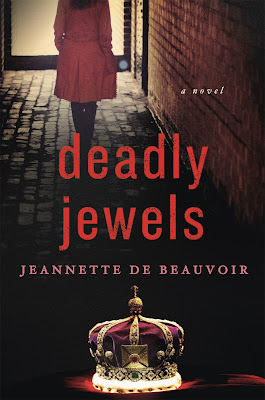The Past is a Foreign Country, by Jeannette de Beauvoir
“The past is a foreign country: they do things
differently there.” These famous opening words to an L.P. Hartley novel
encapsulate the real problem with studying history. It’s not just a matter of
dates; it’s a matter of a whole culture that needs to be understood. And so,
because the job is immense, we tend not to do it.
Unless,
of course, we’re novelists, who go boldly where (in many cases) we should
probably have feared to tread.
I
integrate some history, in some way, into nearly all of my books, even the
mystery novels. Whether it’s personal history (a family secret, an obscure act
from the past, a hidden relationship) or community history (an old murder, a
reinvented personality, a buried treasure), there’s a lot there that can
provide a perfect backdrop for a modern mystery to be solved by a modern
sleuth… as long as the author gets it right.
Because,
after all, the past is indeed a foreign country, and they do in fact do things
differently there. It may feel romantic to write a novel that takes place in
Arthurian Britain, or the antebellum South, or feudal Japan, but really
entering into those times in order to make a story feel at home there takes a
lot of mental, physical, and emotional energy!
For
me, it’s always worked the other way. I don’t know that I’ve ever consciously
chosen an era; I think that they choose me. I grew up in Angers , France
And
once you find a place and time that calls to you, the stories follow. Invariably.
Because when you step away from the dates and kings and factoids that are the
way we learn history and really step into the past as a foreign country, the
stories pop out. My most recent mystery, Deadly
Jewels, seemed to write itself once I learned that in 1940 the British
royal jewels had been carefully prised from their settings by the king and his
two daughters, then shipped off secretly to Montréal for safekeeping in case of
a German invasion: oh, goody! A secret! Wherever there’s a secret, there’s the
possibility of intrigue, of blackmail, of the past coming back to haunt the
present.
The
first Martine LeDuc mystery, Asylum,
pretty much wrote itself as well. In reading about the history of Montreal
No
matter what time and place you write about, you have to do research. Just as
someone writing a hard-boiled police procedural wouldn’t fail to find out about
the caliber of various guns and the habits of underworld criminals, so the
mystery writer dipping into the well of the past must spend time in their
chosen “foreign country.” And it’s hard work. We might well love to write, but
that doesn’t mean it’s easy, or that it isn’t work. And it can be emotionally
draining. I’ve spent a lot of time with my head in places that I’d really
rather not go and learning things that I didn’t want to know, because that’s
how you explore another culture: by immersion in it, all of it, the pretty
parts and the dark places.
And
as a mystery writer, it’s almost always those dark places that intrigue. It’s a
safe way to explore some of the darkness we experience today, whether in our
own times or in our own lives. It puts things in a kind of perspective. And,
like any travel, it enriches the traveler.
There
are a lot of mysteries that take place in the past, as well as other writers
who take buts of the past on which to base present-day mysteries. Why not
explore one or two of them? It’s a wonderful way to learn just how “they do
things differently there.”
Although Jeannette de Beauvoir grew up in Angers, France, her
American mother kept the home well-stocked with Golden Age mystery novels, and
everything that has happened since can probably be traced back to reading them
at a very young age. She writes historical and mystery fiction (often combining
the two) and her most recent novel, Deadly Jewels, concerns a Montréal murder from WWII, disappearing diamonds, a
neo-Nazi group, errant stepchildren, and—of course—several meals involving
poutine. Find her on Amazon,
Goodreads,
Criminal
Element, or her website.
When
Martine LeDuc, publicity director for Montréal, is summoned into the mayor's
office, she's pleasantly surprised to find the city is due for a PR coup: a
doctoral researcher at McGill
University Canada





Comments